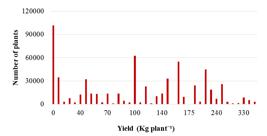Abstract
This study was designed to analyze the relationship between guava crop production variables in the Matão region of central São Paulo, Brazil, and to better understand the economic importance of this crop to its growers. Data were obtained through a questionnaire applied during interviews with guava growers and after the data collection, statistical analyzes were made using Chi-Square hypothesis tests. Analysis results indicate a distinct association between the variables variety and plant age, between variety and number of plants per hectare, andbetween number of plants per hectare and yield, while no association was found between yield and variety. The Paluma guava variety spaced seven meters by five meters apart and pruned throughout the entire year was found to be the most common crop arrangement. The mean yield of the plots studied was 110 Kg plant-1. The use of irrigation added 22.8 Kg of guava production per plant, annually.
Index terms
chi-square test; Psidium guajava; variety; yield; economic importance

 Thumbnail
Thumbnail
 Thumbnail
Thumbnail
 Thumbnail
Thumbnail
 Thumbnail
Thumbnail
 Thumbnail
Thumbnail




